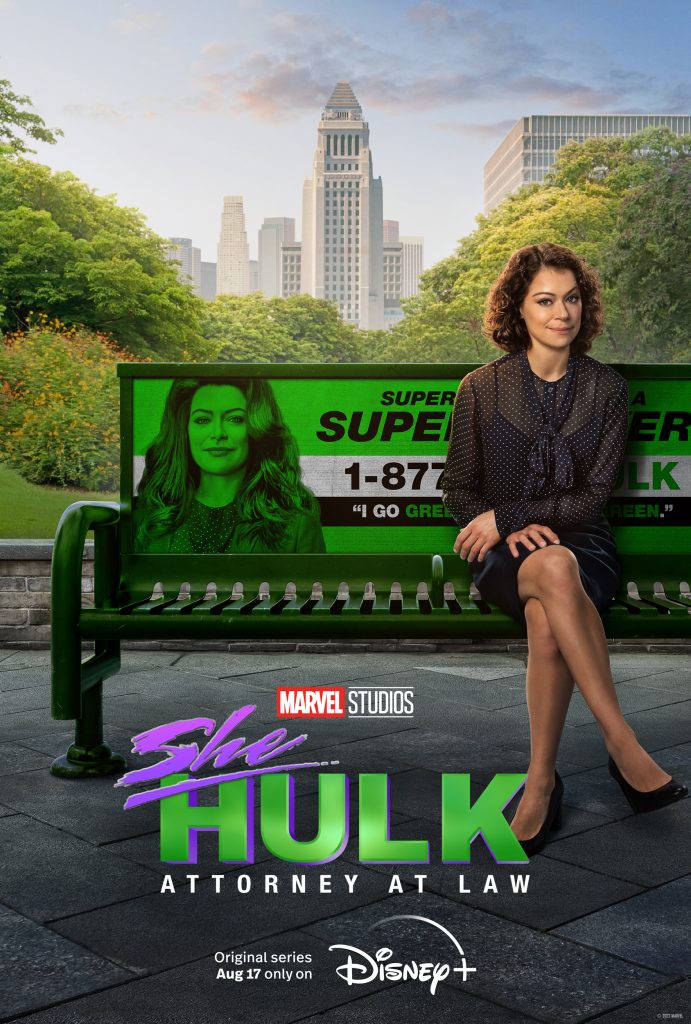“She-Hulk: Attorney at Law,” a new addition to the Marvel Cinematic Universe (MCU), is now streaming on Disney Plus. Tatiana Maslany stars as Jennifer Walters, a lawyer who has the ability to transform into a Hulk. The origin of Walters’ identity as She-Hulk is introduced in the fast-paced pilot episode through the breaking of the fourth wall — a technique utilized throughout the show for comedic effect — followed by a flashback revealing how she received her abilities — a car accident that resulted in the mixing of blood between Walters and her cousin Bruce Banner.
Episode one opens with Jennifer Walters rehearsing a closing statement, during which she asks, “What is the responsibility of those with power?” — a question largely answered through Walters’ reaction to her own newfound abilities. Initially, Walters feels reluctant to fully accept her powers, as following the path of a traditional superhero would mean giving up her social life and the career she has spent both time and money on. Thus, Walters expands on the definition of what it means to be a hero, bringing to light that ordinary people, like lawyers, can play a role in bringing justice and order to the world.
“She-Hulk: Attorney at Law” distinguishes itself from other superhero stories. Due to circumstances beyond her control, Walters is forced to reveal her powers to the world, ridding her of the need for a secret identity and leading to her position as a lawyer in the superhuman law division. As such, despite containing a few fun and well-choreographed fight scenes, many of the superhero team-ups throughout this series take place in a courtroom, as Walters utilizes the legal system to settle supernatural disputes. This leads to the arrival of many entertaining and absurd situations, as beings with abilities that are not easily explained are held accountable for their actions through the mundane legal process.
Another unique aspect of the series is the blatant but well-intentioned attempt to tackle what Marvel has only vaguely addressed before — the hardships of being a woman, especially a woman in a position of power in modern-day society. Throughout the series, Walters struggles with being belittled and looked down upon for being a woman. The series comments on the moniker “She-Hulk,” conveying that this superhero title may promote and solidify the opinion that Jennifer is simply the less capable female counterpart of her cousin. Jennifer is portrayed as a woman of high status, both due to her job as a lawyer and the fact that she is much stronger than the average citizen, yet many people, specifically men, believe her power was simply handed to her and claim she is not worthy of it. Thus, the show endeavors to critique the way in which society refuses to acknowledge competent women.
Although “She-Hulk: Attorney at Law” connects with the rest of the MCU, as seen by the cameos of well-known characters and the references to previous Marvel films, the series also succeeds when viewed as a standalone, largely due to its more comedic, lighthearted tone. Despite being within the superhero fiction genre itself, the series pokes fun at the cliché and formulaic nature of superhero stories. Essentially, the series does not take itself too seriously, allowing for some creative choices when it comes to editing and scriptwriting. Although the movements of She-Hulk, a character made entirely with CGI, were occasionally jerky or unnatural, Tatiana Maslany’s charm and comedic timing are what jumped out the most. Ultimately, Maslany’s endearing performance as Jennifer Walters, a lawyer turned superhero, is the backbone of the series.
Rating: 4 out of 5 stars



